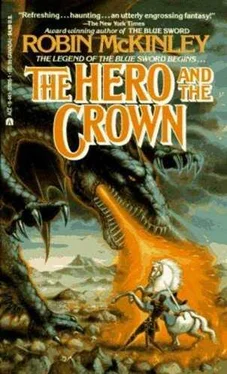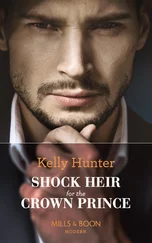Drink.
Then she looked again at her left hand and arm, and she thought calmly. That is not my hand; this one is smaller, and the fingers are more delicate than ever mine were. She withdrew the hand, and put it to her head, and pulled a wisp of her hair free, and held it before her eyes. It was the color it had used to be, before Maur burned it; but the hairs of it were finer.
Aerin, said the red man; you shall take this, and drink it.
In a voice not hers she replied: No. But the voice despaired and the red man heard the despair, and thrust the goblet at her the more eagerly, knowing that he would succeed. Drink.
Slowly, hopelessly, her left hand reached out again, and took the goblet, and held it to her lips; but she did not taste what was within it, for she heard her name again, and paused.
Aerin.
This was not the red man’s voice, but another one, familiar to her. Aerin. The voice was Luthe’s voice, and frantic.
The red man heard it too, and whirled around; the cloak spun on his shoulders, but still she saw nothing of his face. Luthe! he cried. You shall not have her!
Luthe’s voice laughed weakly. No, I won’t; but I shall have the other one; you shall not have them both.
Then there was a roaring around her, and it seemed that the red walls of the five-sided chamber were angry red mouths; but then the red faded to grayness, and yet still the roaring went on; and suddenly the grayness was the grayness of stone walls, not the pale stone of Luthe’s hall, but the grey and darker grey and dull red and black of her City; but before its walls lay a desert plain, empty and barren, and three of the four monoliths that marked the City gates lay on their sides, and she saw no folk anywhere. She opened her mouth to scream, but her mouth filled with silver water, and she choked, and struck out with her hands; and felt sunlight on her face. Next she realized that she had a stiff neck; and then found she was stiff all over, from lying on ... rocks.
No wonder she hurt. The dreams faded under the onslaught of the physical discomfort. She bent an elbow to prop herself up on, and then thought to open her eyes first. Trees, blue sky. Stones. She pulled herself up on the elbow. Stones, trees, blue sky. Lake. Luthe.
He sat up beside her. “Ack,” he said, and stretched cautiously. He was soaking wet; it occurred to her then that she was too, although they were some distance from the water’s edge—nearer, in fact, to the trees. Then there was a familiar stomp and whiffle behind her, and she reached up without looking to encounter Talat’s silky cheek.
Luthe was getting to his feet; he looked as stiff as she felt. He watched her inscrutably as she staggered to her feet and stood beside him. The lake’s surface was smooth as glass. It was strangely silent where they stood; she heard nothing but the distant chirp of a bird and the occasional whisk of Talat’s tail.
Nothing.
“I can breathe,” she whispered.
“Ah,” said Luthe. “Yes, I hoped for that.”
Then the cacophony of her dreams rushed back. The red man she discarded, but—“My City—”
Luthe’s inscrutable look settled over his face as if it was there for life. “Later.”
“Later? The end of my land, my City, my people? Later?” My land, a far-off thought said to her mockingly. My City. My people.
“Yes, later,” he said gruffly. “It hasn’t happened yet, and your destiny lies elsewhere.”
She stood rooted to the ground, staring at him. “My destiny lies elsewhere,” she said in a high voice. “My destiny has always lain ... elsewhere.”
His face softened. “Yes, that’s true, but not quite the way you think. Come. I’ll tell you what I can—of what you need to know. We’ll have to hope it’s enough.”
“It will have to be enough,” she said fiercely, and as he looked into her eyes they were golden from the flames of her dreams; and he feared then for what he had done. “I had no choice,” he murmured to himself, but Aerin, still fierce in her fear, said, “I can’t hear you. What are you saying?”
Luthe shook his head. “Nothing that will do you any service to hear. Come, then. What has happened to you is not all bad.”
HER VISION HAD CLEARED with her lungs, and just as she smiled involuntarily every time she took a deep breath, she was also fascinated by the sight of things like leaves on trees, or the way the muscles moved under Talat’s skin when he went tearing across his meadow, bucking and kicking like a colt. She went for long directionless walks through the forests of Luthe’s high valley, or strolled along the edge of the silver lake, watching tiny rainbows reflect off the water. If she was absent too long, Luthe came to fetch her; he always seemed able to find her without trouble, however far she’d wandered. Occasionally he came with her when she set out.
She had paused, staring at a tree like many other trees, but the leaves of it were waving at her; each tiny, delicate, sharp-edged green oval shivered just for her when the breeze touched it; turned that she might admire its either side, the miniature tracery of green veins, the graceful way the stem fitted to the twig, and the twig to the branch, and the branch set so splendidly into the bole. A green vine clung round the tree, and its leaves too stirred in the wind.
Luthe idly snapped a small twig from the vine and handed it to her. She took it without thinking and then saw what it was—surka—and all her pleasure was gone, and her breath caught in her throat; her fingers were too numb even to drop what they held.
“Hold it,” snapped Luthe. “Clutch it as if it were a nettle.”
Her frantic fingers squeezed together till the stem broke, and the pale green sap crept across her palm. Its touch was faintly warm and tickly, and she opened her hand in surprise, and a large furry spider walked onto her wrist and paused, waving its front pair of legs at her.
“Ugh,” she said, and her wrist shook, and the spider fell to the ground and ambled slowly away. There was no sign of the broken surka twig.
Luthe snorted with laughter, tried to turn it into a cough, inhaled at the wrong moment, and then really did cough. “Truly,” he said at least, “the poor surka can be a useful tool. You cannot blame it for the misfortunes of your childhood. If you try to breathe water, you will not turn into a fish, you will drown; but water is still good to drink.”
“Ha,” said Aerin, still shaken and waiting for the nausea or the dizziness, or something; she hadn’t held it long, but long enough for something nasty to result. “The taste of water doesn’t kill people who aren’t royal.”
“Mmm. If the truth be known, the touch of the sap of the surka doesn’t kill people who aren’t royal either, although eating it will certainly make them very sick, and the royal plant makes a good story. It’s the kelar in your blood that brings the surka’s more curious properties out—although poor old Merth killed himself just as surely with it. As you would have killed yourself were it not for your mother’s blood in your veins—and serve you right for being so stupid about that Galooney woman. Anything powerful is also dangerous, and worth more respect than a silly child’s trick like that.”
“Galanna.”
“Whatever. All she uses her Gift for is self-aggrandizement, with a little unguided malice thrown in. Tor doesn’t realize how narrowly he escaped; a flicker more of the Gift in her and less in him and he’d have married her, willy-nilly, and wondered for the rest of his life why he was so miserable.” Luthe did not sound as though the prospect caused him any sorrow. “But you have no excuse for falling into her snares.”
“What is kelar?”
Читать дальше












